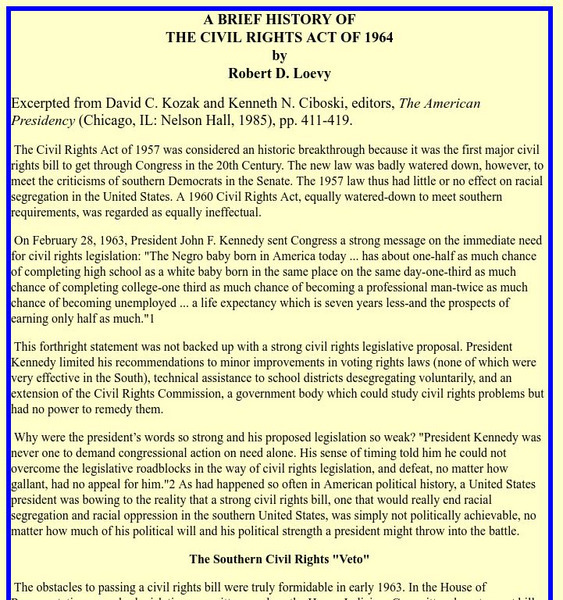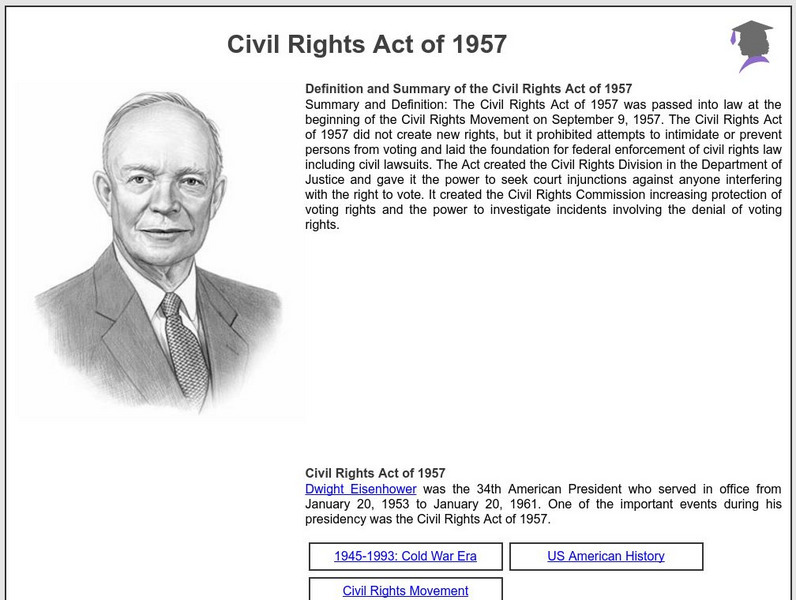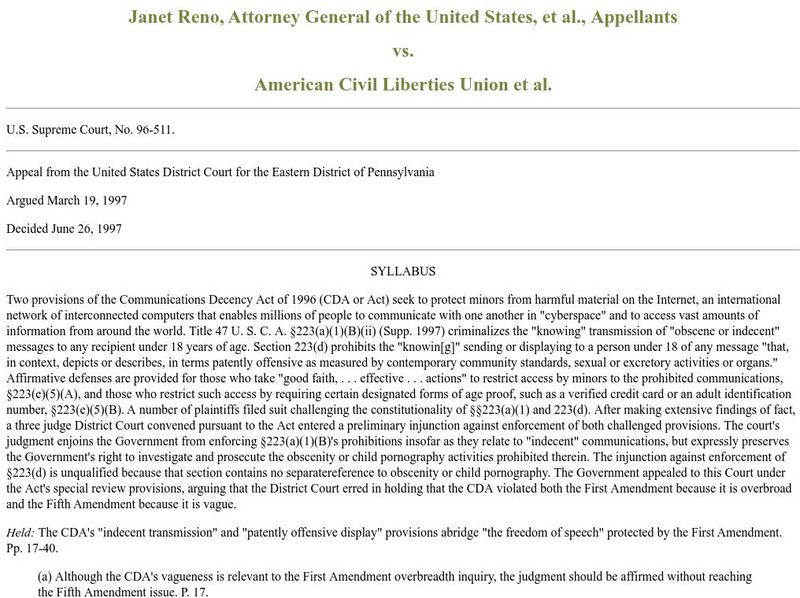US National Archives
Nara: Teaching With Documents: Civil Rights Act of 1964 and the Eeoc
The Civil Rights Act of 1964 prohibited not only discrimination based on race, but also gender. Use this lesson plan to explore the document, particularly Title VII in examining the law.
PBS
Pbs Learning Media: Documenting Brown: Civil Rights Act of 1964
The Civil Rights Act of 1964 helped enforce the Brown ruling, a decade later.
US National Archives
Our Documents: Civil Rights Act (1964)
Find an image of the Civil Rights Act of 1964, signed by President Lyndon Johnson on July 2, 1964. Read a brief description of how this life-changing legislation came to be.
CommonLit
Common Lit: The Civil Rights Act of 1964
A learning module that begins with "The Civil Rights Act of 1964" by National Park Service, accompanied by guided reading questions, assessment questions, and discussion questions. The text can be printed as a PDF or assigned online...
Other
Colorado College: A Brief History of the Civil Rights Act of 1964
A very good explanation of the problems and political machinations that happened behind the scenes in both the House of Representatives and Senate as the wording of the Civil Rights Act of 1964 was developed. See how the legislation was...
Khan Academy
Khan Academy: The Civil Rights Act of 1964 and the Voting Rights Act of 1965
Read about the Civil Rights Act of 1964 and the Voting Rights Act of 1965 which sought to make discrimination illegal, and the resistance they faced from the public and government officials. As time passed, African Americans began to...
Library of Congress
Loc: American Women: Civil Rights Act of 1964
The Civil Rights Act of 1964 was not focused just on racial civil rights, but also gender equity. This site from the Library of Congress deals with how women could use the legislation in lawsuits charging discrimination.
Digital History
Digital History: Civil Rights Act of 1964
A brief description of the Civil Rights Act of 1964, the opposition against it, and how the law prohibited discrimination in voting, housing, public facilities, and employment.
Siteseen
Siteseen: American Historama: Civil Rights Act of 1957
Informative article on the Civil Rights Act of 1957 that was intended to protect the right of African Americans to vote.
University of Virginia
Virginia Center for Digital History: Television News of the Civil Rights Era
A rich collection of streaming video samples of television news footage from 1950 to 1970, along with an assortment of primary source documents, first-person accounts, a glossary of terms, and essays and analysis for learning about the...
National Humanities Center
National Humanities Center: Teacher Serve: Freedom's Story: The Civil Rights Movement: 1968 2008
An excellent essay from the National Humanities Center that explores the civil rights movement after the groundbreaking legislation in the 1960s. It looks at how the civil rights movement has transitioned in the last part of the 20th and...
Black Past
Black Past: Civil Rights Congress (1946 1956)
This encyclopedia entry talks about the Civil Rights Congress, a group that gave legal defense for blacks, but was hampered by its support of the Communist Party during the Cold War.
Other
Janet Reno vs. American Civil Liberties Union
A complete transcript outlining the court case between Janet Reno, U.S. Attorney General, and the American Civil Liberties Union, in which the Communications Decency Act was declared unconstitutional.
National Geographic
National Geographic: The Impact of the Jfk Assassination on American Politics
Students investigate the impact John F. Kennedy's assassination has had on American politics since that event. After his death, Lyndon B. Johnson pushed through the Civil Rights Act of 1964 and the Voting Rights Act, both of which had...
Ducksters
Ducksters: Civil Rights for Kids: African American Civil Rights Movement
Kids learn about the history of the African-American Civil Rights Movement including segregation, Jim Crow laws, protests, Martin Luther King, and the passage of the Civil Rights Act on this site.
Library of Congress
Loc: congress.gov: Lilly Ledbetter Fair Pay Act of 2009
The Lilly Ledbetter Fair Pay Act, 2009 amends the Civil Rights Act of 1964. It redefines the circumstances under which unlawful employment practice occurs. A summary of the Bill and its status is included.
Digital History
Digital History: The Great Society and the Drive for Black Equality
Read about President Lyndon Johnson's vision for the Great Society. See how the programs instituted were focused on lifting the poor from poverty, especially African Americans. Included were laws to increase civil rights and voting...
PBS
Pbs Teachers: Foreign War and Domestic Freedom: (Civil Liberties Lesson Plan)
A lesson plan that directs students to review the concept of civil liberties and to examine examples from American history wherein rights were restricted. They will investigate key arguments between those who seek to restrict liberties...
Alabama Humanities Foundation
Encyclopedia of Alabama: Selma to Montgomery March
One of the most famous events in Civil Rights history, this report covers the Selma to Montgomery March for voting rights.
Ducksters
Ducksters: Civil Rights for Kids: Disability Rights Movement
Kids learn about the history of the Disability Rights Movement including the Architectural Barriers Act, the Americans with Disabilities Act, and famous disabled people on this site.
Digital History
Digital History: The Equal Rights Amendment
In 1972, Congress passed the Equal Rights Amendment (ERA) to the U.S. Constitution. The ERA subsequently failed to be ratified by the necessary number of states and was never added to the Constitution.
Digital History
Digital History: September 11, 2001
This site has a comprehensive overview of the September 11, 2001 attacks on the U.S., including information on Osama bin Laden's background, the formation of Al Qaeda, the attacks themselves, the US response, civil liberties and national...
Vocabulary.com
Martin Luther King, Jr.'s "I Have a Dream" Speech
This site contains a list of 80 words from the "I Have a Dream" speech (1963) by Dr. Martin Luther King, Jr. Teachers can digitally assign this list to their students to reinforce the spellings, pronunciations, and meanings of these words.
Digital History
Digital History: Viva La Raza!
This Digital History site provides an informative overview of the Mexican American civil rights movement in America.
Other popular searches
- Civil Rights Act 1964
- Civil Rights Act of 1964
- Civil Rights Activism
- Civil Rights Act 2001
- Civil Rights Act Canada
- Civil Rights Act 1965
- Civil Rights Act 1866
- Civil Rights Act 1968
- Civil Rights Activists
- Civil Rights Act of 1866
- Jewish Civil Rights Activists
- Civil Rights Activities




















